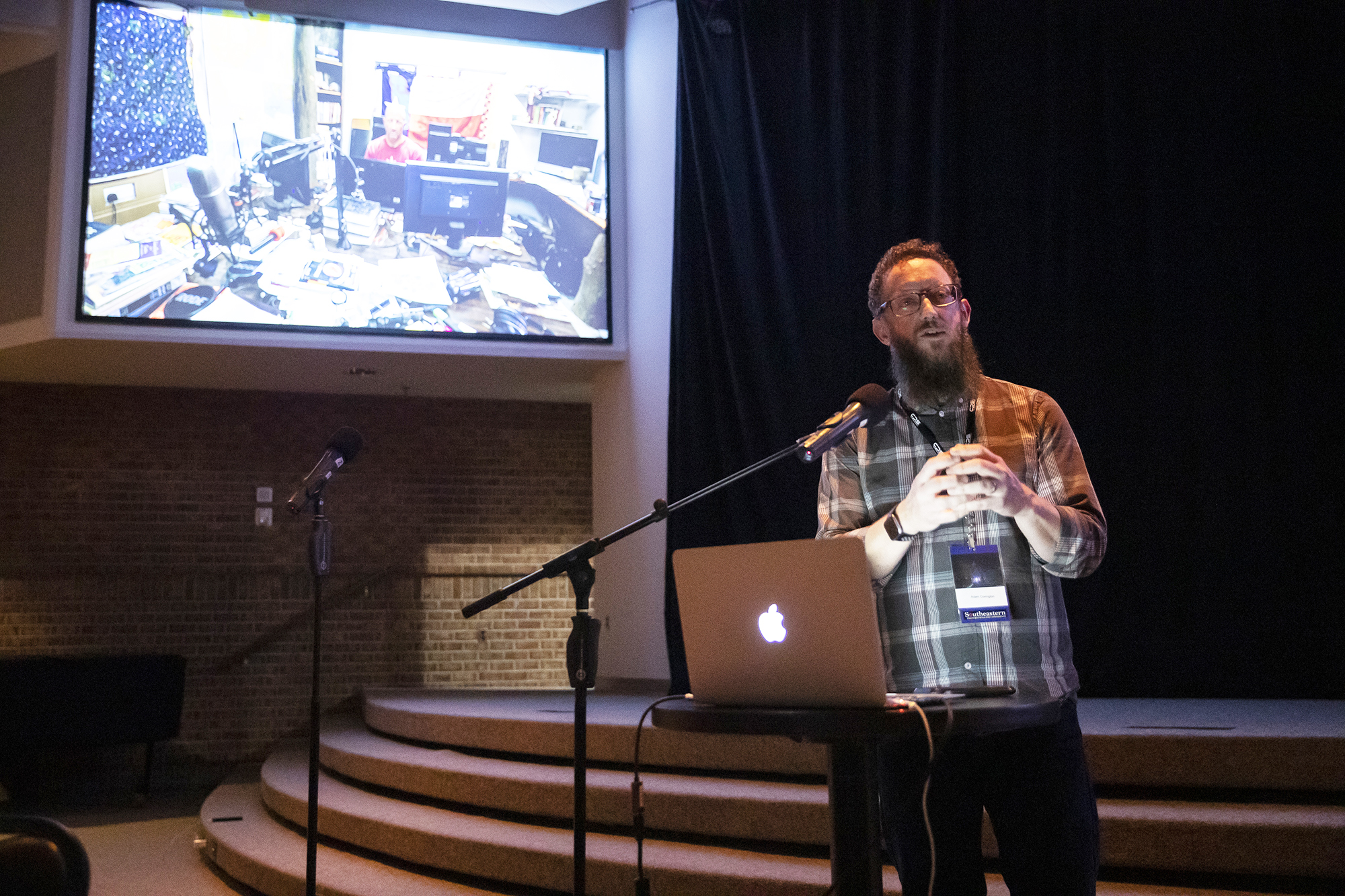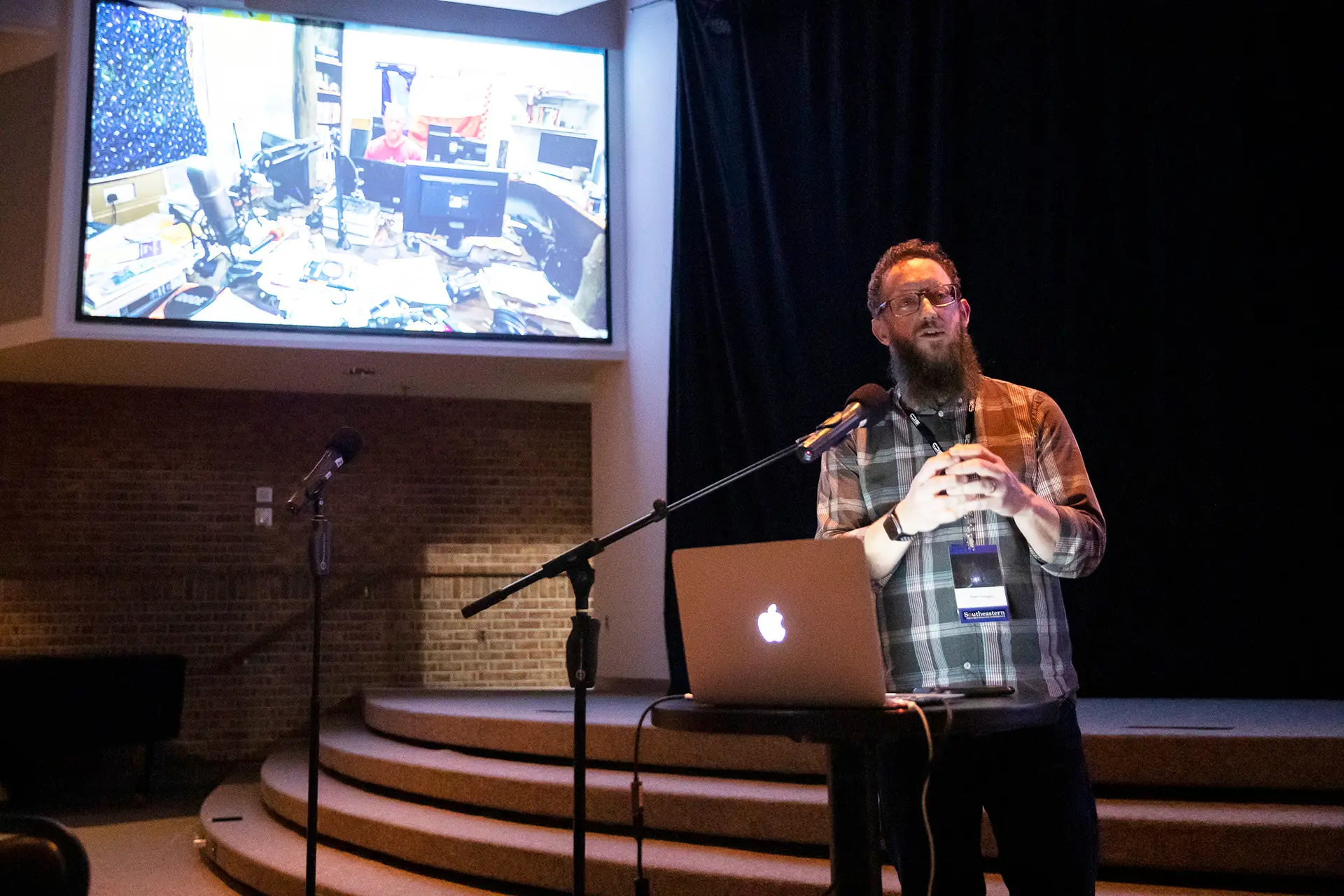NASHVILLE, Tenn. – On his rollerblades, Adam Covington, then 14, performed as requested by a two-man video crew from the International Mission Board (IMB).

They instructed the teenager how to operate their state-of-the-art camera to capture some of his rollerblading moves in the Russian city where his parents were missionaries.
Covington shot video at various angles and held the camera between his legs and even did some jumps for a “Kids on Mission” segment.
“There was a moment when I wiped out and totally sacrificed my knees and my elbows to hold that camera up in the air,” Covington recounted as a featured speaker during the Southeastern Photojournalism Conference in Nashville.
“You’re a video guy!” the impressed IMB duo exclaimed.
“I never knew that would be sort of prophetic,” said Covington, director of communications at the Southwestern Baptist Theological Seminary in Fort Worth, Texas, who has traveled to 30 countries on five continents for photo, video and writing assignments.
“Combining fun and work – you can do those things? Those two guys, in a sense, gave me the idea that this could be something that I could do.”
Joining Covington at the Jan. 31-Feb. 1 conference were Dave Black, whose photographs have appeared in Sports Illustrated and Newsweek and on ESPN; Dawn Majors, a photographer for the state of Tennessee; Helen Comer, photographer for The Daily News Journal in Murfreesboro, Tenn.; and freelance writer and photographer Sonja Singh.
“It’s been a wild ride,” Covington said, describing himself as an “accidental photographer.”
“People have invested in me, and I’ve had the opportunity to invest in others. … [Through] the different paths that have brought me here, the Lord has been faithful,” he said, encouraging conference attendees at the Southern Baptist Convention Building in Nashville “to do the work that you care about and that you love doing.”
A faith & media trajectory
At age 8, Covington had made a profession of faith at the Alaska church, First Baptist in Wasilla, where his parents were serving before venturing with their family to the eastern side of Russia, to the city of Khabarovsk (pronounced kha-ba-rosk).
Two years after the IMB video team’s visit in Russia, Covington, then 16, became “locked in” on Christian service. His resolve: “I don’t know what I’m going to do with my life, but I want to use it for what God has called me to do. If it’s being a preacher, then that’s it. Or if it’s taking pictures. Or whatever the Lord wants,” he said in an interview.
He earned a broadcast communications degree from Union University in Jackson, Tenn., then did media work for two years in Moscow as part of the IMB Journeyman program for recent college graduates. He traveled across the country’s 11 time zones to work on missionaries’ needs for video, web and print resources in Russia’s still-emerging post-communist milieu.
Returning to the States, he took his first job at Southwestern as a part-time videographer in 2006, which expanded over the years to the range of video needs at the seminary as well as photography and writing for “Southwestern News,” the seminary magazine published three times a year.
Not just as a photographer, but also as a Christian, Covington noted the opportunity for “making the invisible visible,” drawing from the phrase in graphic design and other creative circles.
“Sometimes that might be to the Baptist layperson who doesn’t have any idea that there’s a missionary in an undisclosed location in Asia who is leading someone to faith or being persecuted or needs support to get Bibles in the hands of those who have never had a Bible in their language before,” he said in the interview.
For those in seminary, Covington said, it is “a concentrated time where they’re learning Hebrew or systematic theology or missions and then they go and do it.
“And then we get to tell the story of how God is using them uniquely somewhere in the world to tell the greatest story – the gospel story.”
Travels & a turning point
A trip to Greece occasioned one of the most memorable moments in Covington’s travels when he and a coworker were tracing the apostle Paul’s second missionary journey for the magazine in 2011 and highlighting some of the Southwestern alumni who were serving in those current-day locations.
One Sunday, he witnessed the baptism of a refugee husband and wife in the same place, Lydia’s Pool, where Paul baptized his first convert on European soil as recounted in Acts 16.
In Cuba for a 2014 trip involving a Baptist seminary in Havana in partnership with Southwestern, Covington was stirred by riding with a Baptist leader “pointing out building after building and saying, ‘We have a church in this apartment building, we have a church in that apartment building,’ showing how the house church network had flourished in Cuba.
“Of course it was Cuba,” Covington commented. “Having lived in Russia in its post-communist time and knowing the lingering effects of communism, and then going to Cuba, which is presently communist, but seeing the tropical island and the old American cars – it was so familiar to me from the communist perspective but so disparate from the cultural perspective.”
None of this, however, might have ever happened without the nurture of his mother, Robin, and father, Randy, currently executive director of the Alaska Baptist Convention.
In college, Covington had a season when “I fell in with a crowd that wasn’t following the Lord.” In one of his phone calls with his mother, she said she was praying for him and asked, “Are you going to church? Are you reading your Bible?”
“I said, ‘I’m going to read my Bible tonight and go to church tomorrow. I promise.'”
In opening his Bible, he noticed 1 Corinthians 15:33-34: “Do not be deceived: ‘Bad company corrupts good morals.’ Come to your senses and stop sinning; for some have no knowledge of God. I speak this to your shame.”
Covington saw both a warning against the path he was on and the imperative to share his faith with those who are spiritually lost.
“I realized all my life I had been poured into with the gospel, with the message of Scripture. And I shouldn’t take that for granted.” The Cooperative Program, Southern Baptists’ channel for missions and ministry support, even came to mind, “the fact that the CP had paid for my parents to be missionaries and had paid for some of my schooling.
“It was like, I’ve been poured into, but I haven’t been pouring anything back. I realized I’m not ignorant about God and I should be sharing what I know.”
Written by Baptist Press, the official news service of the Southern Baptist Convention.

